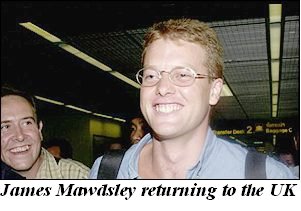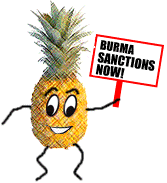Wednesday, April 05, 2006
Human Rights Abuses in Burma (part 2)
In 1999 the regime even demonstrated that they were prepared to imprison foreign citizens for speaking out; James Mawdsley, a Roman Catholic aid worker was sentenced to seven years in jail for carrying pro-democracy leaflets. He was placed in solitary confinement and beaten by guards while the UK and UN pressured the regime for his release. Eventually Mawdsley was  released in 2002 with the then Foreign Sectary Robin Cook stating:
released in 2002 with the then Foreign Sectary Robin Cook stating:
"James's only crime was to highlight the suppression of ethnic minorities in Burma and to call for democratic change". [1]
Freedom of press is also non-existent in Burma; a situation reflected by the country rating 165 out of 167 in Reporters Without Borders free press index [2]. All legal media is controlled by the regime and newspapers are forced to print propaganda and omit any stories critical of the regime. The main newspaper “The New Light of Myanmar” frequently attacks the NLD and since Desmond Tutu and Vaclac Havel have published a report urging the UNSC to intervene in Burma propaganda against the two has featured in almost every issue;
“”Those intent on destroying Myanmar feature,
get into acts of destruction
Purposefully throw stones,
actually it is you who will be disfigured,
Myanmar will retain status quo, and
Will move ahead with chin up.”
This is just one example of the aggressive articles and poetry used as propaganda to discredit pro-democracy campaigners. Just days after a new report revealed that Burma is the most conflict prone nation in the world “The New Light of Myanmar” asked “Where is this Threat to the Peace?”, demonstrating the lies and denial propagated by the regime.[3]
Reporters who deny the regimes strict censorship are often imprisoned or tortured; in 1997 Khin Maung Win, a journalist was sentenced to seven years in prison for his part in making a video interview with Aung San Suu Kyi and smuggling it out of the country. [4] Despite this several Burmese journalists, at great risk to their own lives and liberty send information out of the country to independent press agencies such as Rebound 88, a Burmese Free Press website (www.rebound88.net). This is, however, only appropriate for conveying news of Burma to the outside world as the regime implements strict internet censorship,
“This country is among the very worst enemies of Internet freedom and in many ways its policies are worse than China’s” [5]
This includes the blocking of websites, prohibition of all web-based e-mail and the monitoring of computers every five minute by the military, preventing the viewing of such free press as Rebound 88.
Since 1992, however, Burmese students exiled in Norway have run Democratic Voice of Burma, a radio station broadcasting independent news collected by secret reporters in Burma, back into the country for two hours per-day via short-wave transmission from Norway. This has proved impossible for the regime to block and DVB have launched a satellite television channel to broadcast in Burma for two hours per-week. Although people found listening to or watching DVB broadcasts face severe penalties and even imprisonment this has not deterred the thousands who tune in to receive real, unbiased news, including many listeners in the lower levels of the government. DVB remains the only free, yet outlawed, form of media in Burma, stating,
“Our mission is to provide accurate and unbiased news and to promote understanding and cooperation amongst the various ethnic and religious groups of Burma”. [6] As there is no state religion the regime is fearful of religions as institutions potentially hostile to their rule, indeed many Buddhist monks were involved in the 8888 peaceful uprising. As a result the regime oppresses religious practice in order to prevent what they deem to be ‘subversion’. The US Department of State report on religious freedom in Burma stated,
“the Government imposes restrictions on certain religious activities and frequently abuses the right to freedom of religion… It systematically restricted efforts by Buddhist clergy to promote human rights and political freedom [and] discouraged or prohibited minority religions from constructing new places of worship.” [7]
Freedom of movement is also restricted in Burma and police or military surveillance on people deemed to be potentially dangerous to the regime (or in favor of human rights) is commonplace. The ability to enter or leave the country is also severely restricted as the regime cannot afford to loose the amount of doctors or skilled workers who wish to leave, or for people aware of the human rights situation to give first hand accounts to western governments or charities. As a result the families of those temporarily leaving are used to ensure their return; if somebody stays outside Burma longer than permitted by the regime it is not unusual for members of their family to be imprisoned or tortured.
Finally following the student protests of 1888 the regime closed Burma’s universities, depriving the population of education. In recent years some universities have re-opened teaching government propaganda to those approved of by the regime; in reality freedom of education does not exist in Burma. [8]
[1] BBC news
[2] Reporters Sans Frontiers
[3] Burma Campaign News
[4] Reporters Sans Frontiers
[4] Reporters Sans Frontiers
[6] Democratic Voice of Burma
[7] US Department of State
[8] This has led to the fear that essential skills will be lost and when Burma returns to a democracy it will be lacking doctors, engineers, economists and other crucial roles. To counter this ‘Prospect Burma’, a charity to fund degrees for Burmese exiles, has been set up in Europe.
 released in 2002 with the then Foreign Sectary Robin Cook stating:
released in 2002 with the then Foreign Sectary Robin Cook stating:"James's only crime was to highlight the suppression of ethnic minorities in Burma and to call for democratic change". [1]
Freedom of press is also non-existent in Burma; a situation reflected by the country rating 165 out of 167 in Reporters Without Borders free press index [2]. All legal media is controlled by the regime and newspapers are forced to print propaganda and omit any stories critical of the regime. The main newspaper “The New Light of Myanmar” frequently attacks the NLD and since Desmond Tutu and Vaclac Havel have published a report urging the UNSC to intervene in Burma propaganda against the two has featured in almost every issue;
“”Those intent on destroying Myanmar feature,
get into acts of destruction
Purposefully throw stones,
actually it is you who will be disfigured,
Myanmar will retain status quo, and
Will move ahead with chin up.”
This is just one example of the aggressive articles and poetry used as propaganda to discredit pro-democracy campaigners. Just days after a new report revealed that Burma is the most conflict prone nation in the world “The New Light of Myanmar” asked “Where is this Threat to the Peace?”, demonstrating the lies and denial propagated by the regime.[3]
Reporters who deny the regimes strict censorship are often imprisoned or tortured; in 1997 Khin Maung Win, a journalist was sentenced to seven years in prison for his part in making a video interview with Aung San Suu Kyi and smuggling it out of the country. [4] Despite this several Burmese journalists, at great risk to their own lives and liberty send information out of the country to independent press agencies such as Rebound 88, a Burmese Free Press website (www.rebound88.net). This is, however, only appropriate for conveying news of Burma to the outside world as the regime implements strict internet censorship,
“This country is among the very worst enemies of Internet freedom and in many ways its policies are worse than China’s” [5]
This includes the blocking of websites, prohibition of all web-based e-mail and the monitoring of computers every five minute by the military, preventing the viewing of such free press as Rebound 88.
Since 1992, however, Burmese students exiled in Norway have run Democratic Voice of Burma, a radio station broadcasting independent news collected by secret reporters in Burma, back into the country for two hours per-day via short-wave transmission from Norway. This has proved impossible for the regime to block and DVB have launched a satellite television channel to broadcast in Burma for two hours per-week. Although people found listening to or watching DVB broadcasts face severe penalties and even imprisonment this has not deterred the thousands who tune in to receive real, unbiased news, including many listeners in the lower levels of the government. DVB remains the only free, yet outlawed, form of media in Burma, stating,
“Our mission is to provide accurate and unbiased news and to promote understanding and cooperation amongst the various ethnic and religious groups of Burma”. [6] As there is no state religion the regime is fearful of religions as institutions potentially hostile to their rule, indeed many Buddhist monks were involved in the 8888 peaceful uprising. As a result the regime oppresses religious practice in order to prevent what they deem to be ‘subversion’. The US Department of State report on religious freedom in Burma stated,
“the Government imposes restrictions on certain religious activities and frequently abuses the right to freedom of religion… It systematically restricted efforts by Buddhist clergy to promote human rights and political freedom [and] discouraged or prohibited minority religions from constructing new places of worship.” [7]
Freedom of movement is also restricted in Burma and police or military surveillance on people deemed to be potentially dangerous to the regime (or in favor of human rights) is commonplace. The ability to enter or leave the country is also severely restricted as the regime cannot afford to loose the amount of doctors or skilled workers who wish to leave, or for people aware of the human rights situation to give first hand accounts to western governments or charities. As a result the families of those temporarily leaving are used to ensure their return; if somebody stays outside Burma longer than permitted by the regime it is not unusual for members of their family to be imprisoned or tortured.
Finally following the student protests of 1888 the regime closed Burma’s universities, depriving the population of education. In recent years some universities have re-opened teaching government propaganda to those approved of by the regime; in reality freedom of education does not exist in Burma. [8]
[1] BBC news
[2] Reporters Sans Frontiers
[3] Burma Campaign News
[4] Reporters Sans Frontiers
[4] Reporters Sans Frontiers
[6] Democratic Voice of Burma
[7] US Department of State
[8] This has led to the fear that essential skills will be lost and when Burma returns to a democracy it will be lacking doctors, engineers, economists and other crucial roles. To counter this ‘Prospect Burma’, a charity to fund degrees for Burmese exiles, has been set up in Europe.




